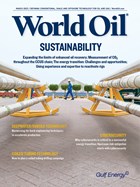McKinsey & Company: Asset productivity programs in energy sector face “serious” cost, talent problems
(WO) – The latest analysis from McKinsey & Company reveals that asset productivity programs for equipment maintenance are facing serious cost and talent problems. A survey of 100 senior leaders in asset-intensive industries, and a third of those from organizations in the energy and oil & gas space, determined that 62% have seen above-inflation increases in maintenance costs, despite many adopting modern approaches. Meanwhile, recruitment of new, qualified talent is also problematic, with 73% of respondents acknowledging the challenge of sourcing new labor.
Asset productivity is noted as a universal priority across the survey participants, as companies actively implement maintenance transformation and seek new technologies to ensure equipment runs with the highest ROI.
For energy and oil & gas respondents, critical assets and a technical workforce are at the core of their operations. The insights highlight opportunities for improvement that can guide organizations, with preventative maintenance, cost management excellence, and people, presenting as the strongest areas for growth.
Sergio Farioli, Partner at McKinsey said, “Irrespective of sector or region, asset productivity programs are widely struggling to deliver the desired outcomes. 45% of survey respondents indicated that their maintenance costs were above inflation by 1 – 5%. Meanwhile, there is a dissatisfied workforce that is acting reactively to maintenance events. For organizations to navigate surging energy prices and unpredictable supply chains with efficiency and high ROI, they should refocus their attention on preventative actions, a systematic approach to skills, and excellence in cost control.”
Considering the three key areas that can improve asset productivity within an organization, McKinsey outlines the steps that can be taken.
Preventative maintenance. In companies with reliability-centered maintenance capabilities, 70 to 85% of technician hours are spent on preventative maintenance activities. However, survey findings report that preventative maintenance tasks contribute to only 51% of overall maintenance activity at the companies studied. Proper planning of preventative maintenance is more cost-effective and less disruptive than a reactive response, and organizations should acknowledge this.
Maximizing skilled talent. Companies need to do more to upskill their workforce to improve their talent retention. Implementing knowledge-sharing systems between technicians also requires higher prioritization as only 55 percent have these systems in place.
Excellence in cost control. A more sophisticated approach is needed to ensure accurate decision making on whether in-house or outsourced personnel are required. Organizations must consider multiple factors, from demand variability for capabilities to the strategic importance of specific capabilities.




